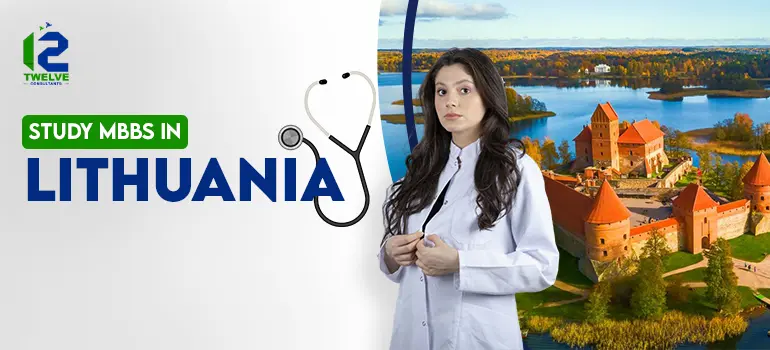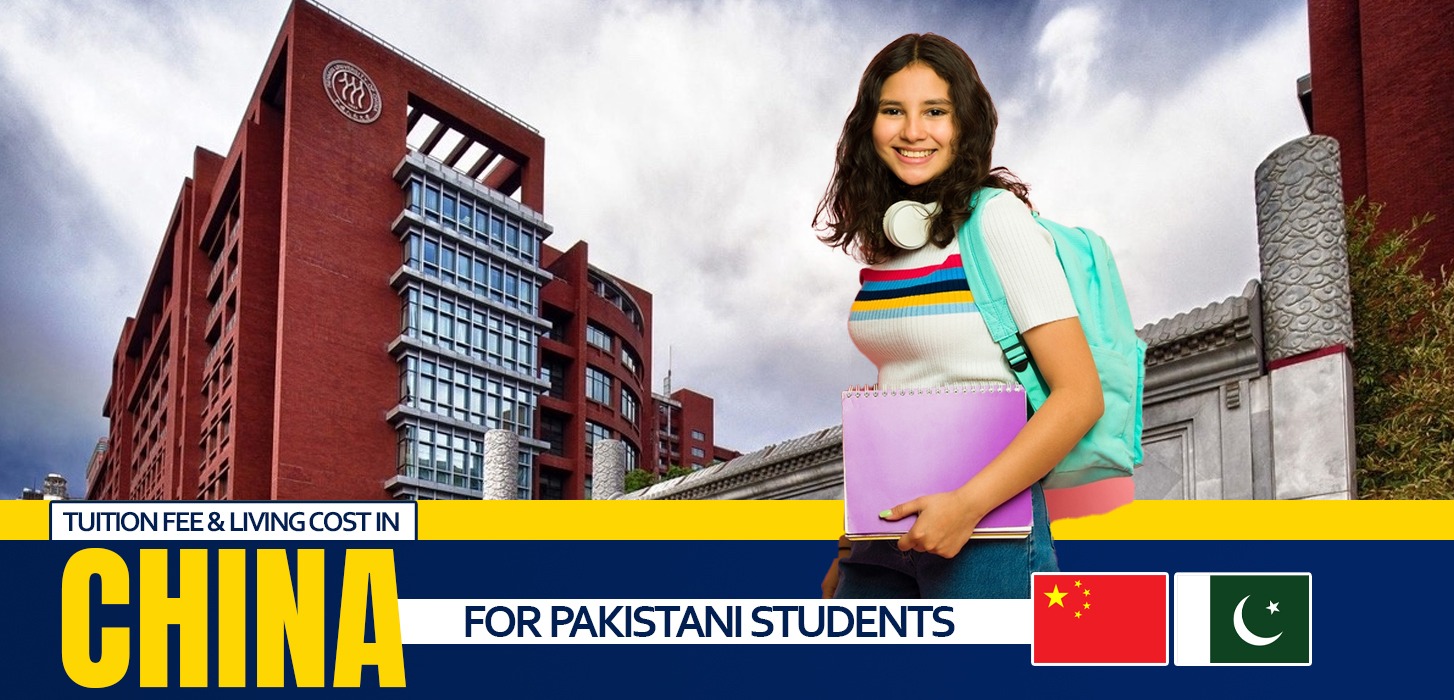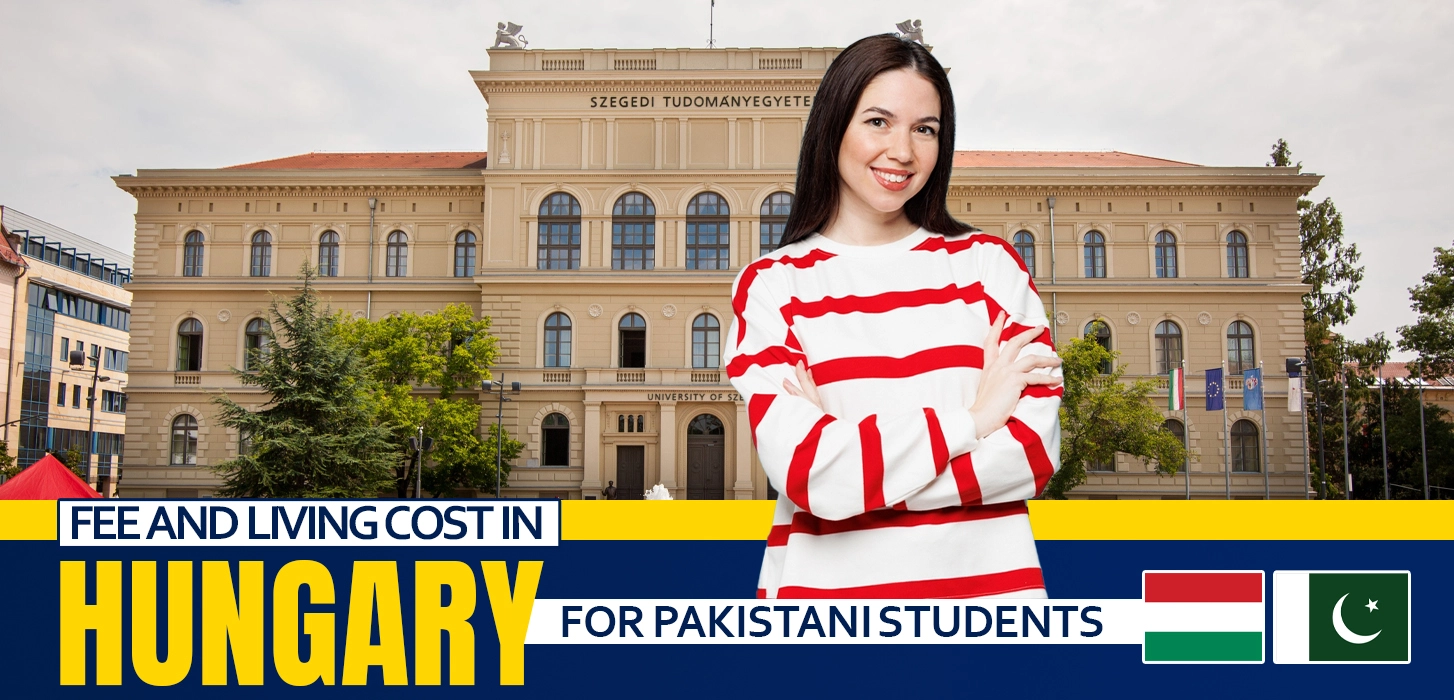
Study MBBS in Lithuania 2025-26 | Tuition Fee | Visa Guide
Lithuania, nestled in the heart of Europe, is becoming a sought-after destination for international students aspiring to pursue a career in medicine. To embark on this enriching educational journey, understanding the intricate admission criteria is essential. This guide provides a comprehensive overview of the MBBS admission criteria for studying in Lithuania.
| Location | Baltic Region, Northern Europe. |
| Currency | Euro (EUR). |
| Language | Lithuanian (Official), English Programs Widely Available. |
| Work Allowed | Part-time jobs available for students. |
| Global Recognition | Degrees recognized internationally. |
| Tuition Fees | Affordable, Varies by Program and University. |
| Accommodation | Costs vary, €150 – €400/month. |
| Living Expenses | Moderate, €300 – €600/month. |
| Intakes | Mainly September, Some in February. |
| Visa Processing | Typically 1-3 months. |
| Application Fee | Varies, Usually €50 – €150. |

Lithuania offers several universities that provide medical education. Below are details for some of the universities in Lithuania known for their MBBS programs:
Vilnius University Faculty of Medicine: Vilnius University, located in the capital city Vilnius, is one of the oldest and most prestigious universities in Lithuania. Its Faculty of Medicine offers a high-quality MBBS program with a focus on clinical skills, research, and patient care. The university collaborates with leading hospitals for practical training. Average Tuition Fee: $6,000 – $9,000 per year.
Lithuanian University of Health Sciences (LSMU): LSMU, situated in Kaunas, is a specialized medical university in Lithuania. It offers comprehensive medical education with a strong emphasis on practical skills and modern healthcare techniques. The university has a diverse international student community. Average Tuition Fee: $5,500 – $8,000 per year.
Vytautas Magnus University Faculty of Medicine: Vytautas Magnus University, located in Kaunas, provides medical education through its Faculty of Medicine. The program focuses on evidence-based medicine, preventive care, and community health. The university offers a supportive learning environment and clinical exposure. Average Tuition Fee: $5,000 – $7,500 per year.
Kaunas University of Technology Faculty of Health Sciences: Kaunas University of Technology offers health sciences programs, including medical studies. The Faculty of Health Sciences provides education in various medical fields, integrating theoretical knowledge with practical training. Average Tuition Fee: $4,800 – $7,200 per year.
| University Name | Average Tuition Fee Range (per year) |
|---|---|
| Vilnius University Faculty of Medicine | $6,000 – $9,000 |
| Lithuanian University of Health Sciences (LSMU) | $5,500 – $8,000 |
| Vytautas Magnus University Faculty of Medicine | $5,000 – $7,500 |
| Kaunas University of Technology Faculty of Health Sciences | $4,800 – $7,200 |
Eligibility Requirements
Prospective students aiming to pursue an MBBS degree in Lithuania typically need to have completed their secondary education with a focus on science subjects such as Biology and Chemistry. Proficiency in the English language is crucial and is often assessed through standardized tests like IELTS or TOEFL. Some universities may conduct their own entrance exams to evaluate applicants’ knowledge in relevant subjects.
Entrance Exams
Entrance exams are a common prerequisite for admission to Lithuanian medical universities. These exams assess applicants’ understanding of subjects such as Biology, Chemistry, and Physics. A strong performance in these exams significantly enhances the chances of acceptance. Thorough preparation and a solid understanding of core concepts are essential for excelling in these assessments.
Application Procedure
Applying for MBBS programs in Lithuania involves completing an online application form and submitting essential documents. These documents typically include academic transcripts, certificates, a valid passport, proof of language proficiency, and results from entrance exams if applicable. Attention to detail and adherence to application deadlines are vital for a successful application process.
Recognition of Degrees
Verifying the recognition of the degree offered by the chosen university is paramount. Opting for universities recognized by international medical bodies such as the World Health Organization (WHO) ensures the global acceptance of the degree. Recognition by national medical councils is also essential for future licensure and practice opportunities in various countries.
Tuition Fees and Scholarships
Lithuania is known for offering competitive tuition fees for international students pursuing medical education. However, fees can vary between universities and programs. Prospective students should research the fee structures of different institutions. Additionally, exploring scholarship opportunities based on academic merit or other criteria can significantly alleviate the financial burden, making medical education in Lithuania accessible to a diverse range of students.
Visa Requirements and Residence Permit
Once accepted into a Lithuanian medical university, students need to apply for a student visa. This process involves providing necessary documents, including the admission letter, proof of financial means, a valid passport, and other relevant documents. After arriving in Lithuania, students are required to obtain a student residence permit, adhering to visa and residence permit regulations throughout their studies.
Accommodation and Living Expenses
Lithuania offers various accommodation options, including university dormitories and private apartments. Students should explore these options based on their budget and preferences. Budgeting for living expenses, covering aspects such as housing, food, transportation, and personal needs, is crucial for financial stability and a comfortable stay throughout the academic tenure.

Admission Process:
Initiate your application process by applying to a recognized medical university in Lithuania. Ensure you meet academic requirements and prepare necessary documents, including transcripts, recommendation letters, and a personal statement. Some universities might require entrance exams or interviews.
Acceptance Letter and Confirmation of Enrollment:
Once accepted, you’ll receive an official acceptance letter from the university. This letter confirms your enrollment and is crucial for your visa application.
Student Visa Application Requirements:
Prepare documents such as a valid passport, completed visa application form, university acceptance letter, proof of financial means to cover tuition and living expenses, travel insurance, and a medical certificate. Requirements can vary, so check the official website of the Lithuanian embassy or consulate in your country.
Language Proficiency and Preparatory Courses:
Ensure you meet the university’s language proficiency requirements. Some universities offer preparatory courses for international students to enhance their language skills before starting the main program.
Visa Application Submission:
Submit your visa application and documents to the nearest Lithuanian embassy or consulate. Adhere to deadlines and ensure all information is accurate and complete.
Visa Interview (if required):
Prepare for a visa interview if it’s part of the application process. Be ready to discuss your plans for studying in Lithuania and your future intentions.
Financial Planning and Scholarships:
Explore scholarship opportunities and plan your finances to cover tuition, accommodation, food, transportation, and personal expenses during your stay in Lithuania.
Health Insurance and Medical Check-up:
Acquire health insurance accepted in Lithuania. Some universities might require a medical check-up upon arrival.
Arrival and Orientation:
Attend the university’s orientation program upon arrival. Familiarize yourself with the campus, local culture, and essential facilities. Register with local authorities as required.
Student Support Services:
Familiarize yourself with the university’s student support services, including academic advising, counseling, and accommodation assistance.
The eligibility criteria for studying MBBS (Medicina) in Lithuania can vary slightly between different universities. However, here are the general eligibility requirements that international students typically need to fulfill to pursue MBBS in Lithuania:
Educational Qualifications:
- Prospective students should have completed their secondary education with a strong academic record in subjects such as Biology, Chemistry, and Physics.
- Most Lithuanian medical universities require a high school diploma or an equivalent qualification.
Language Proficiency:
- Proficiency in English is essential because many MBBS programs in Lithuania are offered in English. Students may need to provide proof of English language proficiency through tests like IELTS or TOEFL.
- Some universities may also offer preparatory courses for students who need to improve their English language skills before starting the MBBS program.
Entrance Exams:
- Some universities in Lithuania require students to take entrance exams in subjects like Biology and Chemistry. The format and content of these exams can vary between universities.
- It’s important to check the specific requirements of the chosen university regarding entrance exams and prepare accordingly.
Interview (if applicable):
- Some universities might conduct interviews as part of the admission process. These interviews assess the candidate’s motivation, communication skills, and suitability for the medical profession.
Application Process:
- Prospective students need to submit a completed application form along with the required documents, including academic transcripts, language proficiency certificates, and letters of recommendation.
- The application deadlines and specific requirements can vary, so it’s essential to check the university’s official website for detailed information.
Health Check and Insurance:
- Students might be required to undergo a medical examination to ensure they are in good health. Additionally, having health insurance coverage for the duration of the studies is often mandatory.
Visa Requirements:
- International students, including those from non-EU countries, need to obtain a student visa or residence permit to study in Lithuania. Visa requirements can include proof of acceptance from a Lithuanian university, financial sufficiency, and health insurance.
MBBS programs in Lithuania typically have a duration of six years, similar to many other countries. The structure of these programs is designed to provide students with a comprehensive education in medicine, combining theoretical knowledge, practical skills, and clinical experience. Here’s a breakdown of the typical structure of MBBS programs in Lithuania:
1. Pre-Clinical Years (Years 1-3):
- Basic Sciences: The initial years focus on fundamental subjects such as anatomy, physiology, biochemistry, and medical chemistry. Students acquire a strong foundation in these subjects, preparing them for the clinical years.
- Pre-Clinical Training: Students engage in pre-clinical training, including laboratory work, dissections, and simulations. This hands-on experience helps students understand the theoretical knowledge in practical contexts.
2. Clinical Years (Years 4-6):
- Clinical Rotations: In the clinical years, students rotate through various medical specialties, including internal medicine, surgery, pediatrics, obstetrics and gynecology, psychiatry, and more. During these rotations, students work directly with patients under the supervision of experienced physicians.
- Clinical Training: Students participate in clinical training sessions where they further develop their diagnostic and patient management skills. They learn to conduct physical examinations, interpret medical tests, and formulate treatment plans.
- Hospital Placements: Students are placed in hospitals and clinics, allowing them to gain practical experience in different medical settings. They work alongside healthcare professionals and get exposure to a wide range of medical cases.
3. Electives and Specializations (Optional):
- Some programs offer elective periods during which students can choose specific medical specialties to explore in-depth. This allows students to tailor their education according to their interests.
- Specialization options might be available for students who wish to pursue a particular field of medicine, leading to additional years of study and training.
4. Internship and Graduation:
- After completing the six-year program, students may be required to undergo a compulsory internship period, during which they work as medical interns in hospitals, gaining practical experience and further honing their skills.
- Successful completion of the internship and passing the necessary exams lead to the award of the MBBS degree.
Yes, international students studying in Lithuania are generally allowed to work part-time. EU and EEA (European Economic Area) students have unrestricted access to the Lithuanian labor market. Non-EU/EEA international students are allowed to work part-time during their studies, typically up to 20 hours per week, with some restrictions during study breaks.
Yes, medical degrees obtained from recognized universities in Lithuania are internationally recognized. Graduates can pursue further education, participate in medical licensure exams, or practice medicine in various countries worldwide. It’s important to choose universities that are accredited and recognized by international medical bodies for global recognition.
Tuition fees for MBBS programs in Lithuania vary depending on the university and program. On average, the annual tuition fees for international students range from €5,000 to €15,000. Living expenses, including accommodation, food, transportation, and miscellaneous expenses, are estimated to be around €400 to €700 per month, depending on the city and lifestyle.

Latest Post
Lithuania has become an attractive destination for Pakistani students seeking...
Many Pakistani students dream of studying abroad but are often...
According to the Ministry of Education and Research report, In...
Pursuing higher education in New Zealand is a top destination...
The UK has always been a student-preferred destination for gaining...
Understanding the tuition fee & living cost in China is...
Hungary is an increasingly popular choice for Pakistani students pursuing...
Studying in Oman is an excellent opportunity for Pakistani students...










